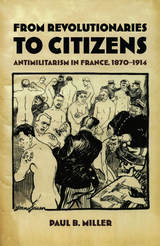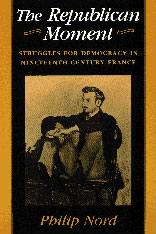
In 1898, the Dreyfus Affair plunged French society into a yearlong frenzy. In Paris and provincial villages throughout the country, angry crowds paraded through the streets, threatening to attack Jews and destroy Jewish-owned businesses. Anger about the imagined power of Jewish capital, as well as fears of treason and racial degeneration, made anti-Semitism a convenient banner behind which social and political factions could fall in line. Anti-Semitic feelings that had been simmering in France for decades came boiling to the surface.
Here Pierre Birnbaum guides readers on a tour of France during this crisis. He shows that in the midst of violence, Jewish citizens bravely and effectively defended themselves and were aided by a police force determined to maintain order. Birnbaum paints a vivid portrait of French Jewish culture at the time and explains why the French state remained strong in this time of widespread unrest.


Although more general accounts of the Left’s “failure” to halt international war in August 1914 focus on its lack of unity or the decline of trade unionism, Miller contends that these explanations barely scratch the surface when it comes to interpreting the Left’s overwhelming acceptance of the war. By embedding his cultural analysis of antimilitarist propaganda into the larger political and diplomatic history of prewar Europe, he reveals the Left’s seemingly sudden transformation “from revolutionaries to citizens” as less a failure of resolve than a confession of commonality with the broader ideals of republican France. Examining sources ranging from police files and court records to German and British foreign office memos, Miller emphasizes the success of antimilitarism as a rallying cry against social and political inequities on behalf of ordinary citizens. Despite their keen awareness of the bloodletting that awaited Europe, he claims, antimilitarists ultimately accepted the war with Germany for the same reason they had pursued their own struggle within France: to address injustices and defend the rights of citizens in a democratic society.

France in the mid-nineteenth century was shaken by a surge of civic activism, the "resurrection of civil society." But unlike similar developments throughout Europe, this civic mobilization culminated in the establishment of democratic institutions. How, Philip Nord asks, did France effect a successful transition from Louis-Napoleon's authoritarian Second Empire to a functioning republic based on universal suffrage and governed by middle-class parliamentarians? How did French civic activism take this democratic turn?
Nord provides the answers in a multidimensional narrative that encompasses not only history and politics but also religion, philosophy, art, literature, and gender. He traces the advance of democratic sentiment and the consolidation of political dissent at its strategic institutional sites: the lodges of Freemasonry, the University, the Paris Chamber of Commerce, the Protestant and Jewish consistories, the Paris bar, and the arts. It was the particular character and unfolding of these struggles, Nord demonstrates, that made an awakening middle class receptive to democratic politics. The new republican elite was armed with a specific vision that rallied rural France--a vision of solidarity and civic-mindedness, of moral improvement, and of a socioeconomic order anchored in family enterprise.
Nord's trenchant analysis explains how and why the Third Republic (1870-1940) endured longer than any other regime since the 1789 revolution. The convergence of republican currents at midcentury bequeathed to the French nation a mature civil society, a political elite highly trained in the arts of democratic politics, and an agenda that encompassed not only constitutional reform but also a reformation of private life and public culture.
READERS
Browse our collection.
PUBLISHERS
See BiblioVault's publisher services.
STUDENT SERVICES
Files for college accessibility offices.
UChicago Accessibility Resources
home | accessibility | search | about | contact us
BiblioVault ® 2001 - 2024
The University of Chicago Press









